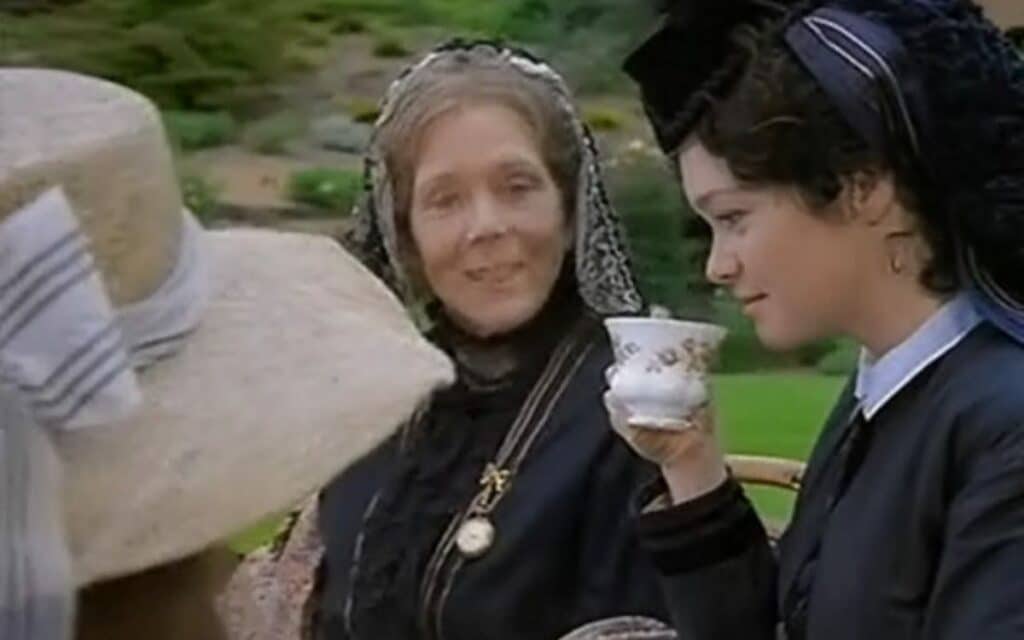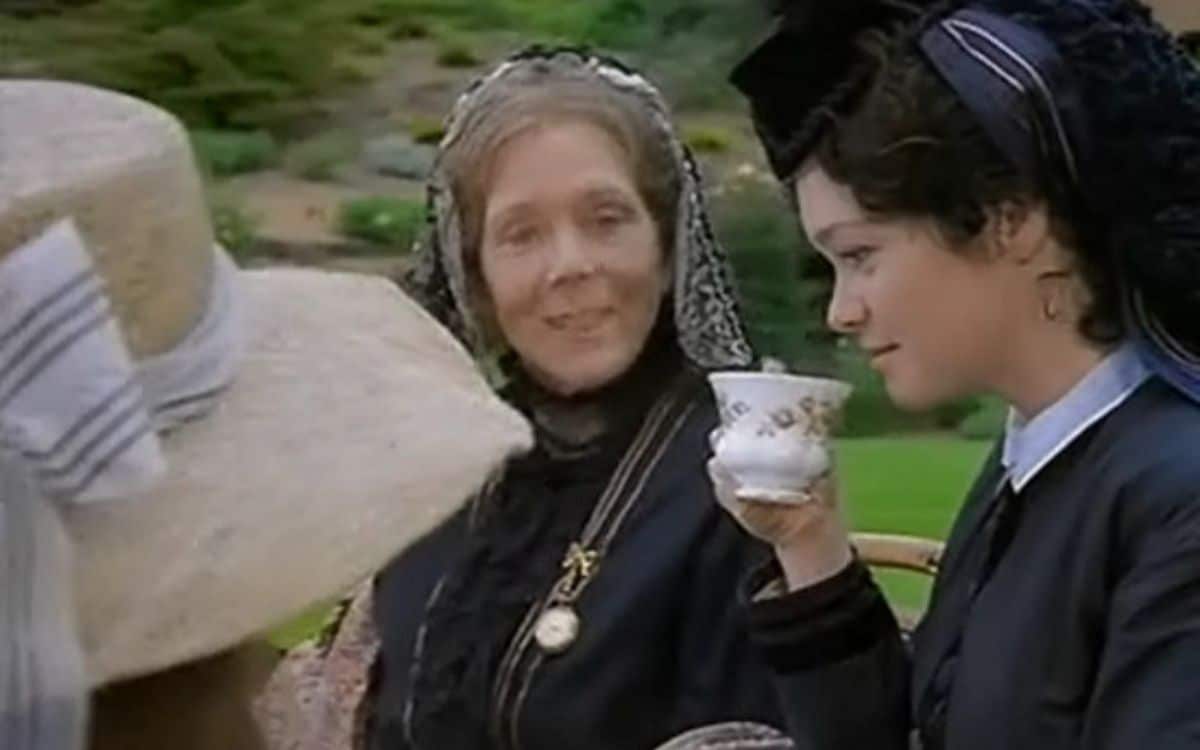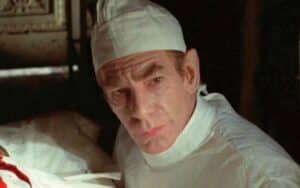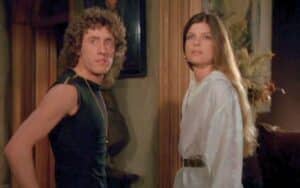The Haunting of Helen Walker 1995, a TV remake of The Turn of the Screw, lacks polish but is worth watching by lovers of traditional ghost stories, writes GEMMA JOHNSON

TITLE: The Haunting of Helen Walker
RELEASED: 3 December 1995
DIRECTOR: Tom McLoughlin
CAST: Valerie Bertinelli, Diana Rigg, Florence Hoath, Aled Roberts, Michael Gough, Paul Rhys, Christopher Guard, Elizabeth Morton, Tricia Thorns, Aisling Flitton, Flip Webster, Mark Longhurst
Review of The Haunting of Helen Walker 1995
Victorians were masters at the art of telling a good old ghost story. It was a popular past time especially in the long winter months when families would be together indoors, and the days were shorter.
Imagine the crackling of the fire, the orange flames contrasting with the darkness and a characteristically charming storyteller, drawing the audience in, and delighting in every ghoulish detail.
The Turn of the Screw is a classical Victorian ghost story, written in 1898 by Henry James, a ghost story that has stood the test of time and continues to be adapted for modern audiences 125 years later.
The most recent adaptation was in 2020 with the hugely popular The Haunting of Bly Manor, directed by Mike Flanagan, a gothic literature lover highly skilled in retelling ghoulish stories with a modern twist.
There have been other adaptations of The Turn of the Screw, one being The Haunting of Helen Walker in 1995.
Where Bly Manor opted to bring the characters, and setting, into a more modern context, The Haunting of Helen Walker remains true to the Victorian era, paying homage to the original storyteller Henry James.
Our leading lady, Helen, presents as vulnerable from the first interaction we have with her.
She is an American living in England, she has lost her husband and has no children or family of her own.
Keen to work, and seemingly find a distraction from the trauma she has experienced, she finds herself in the office of the impatient and uncaring Edward Goffe.
Goffe has become Guardian to his brothers’ children, children who he refers to as ‘the issue’ and ‘the problem’ – charming chap.
Any parent will recall the delight at having children stay out for the night, being eager to drop them off and live with free abandon (well, for the next 12 hours at least), Goffe takes this a step further declaring that he wants ‘someone’ to take over his Guardianship of the children so that he can jaunt around Italy being a bachelor and no doubt sowing his wild oats along the way.
The meeting between Helen and Goffe is a ‘how not to’ guide to interviewing someone to work with children – no questions, no experience, and no references yet Goffe is quick to offer Helen the job.
Perhaps he empathised with her, perhaps he saw potential – more likely he saw a quick way out, an easy escape to live carefree in the Italian sunshine.
With a stern ‘please do not bother me with issues’ and a promise to continue to bankroll the children’s lavish lifestyles, Helen is whisked off to a horse and carriage where she will begin her gradual descent into madness to the background of some jaunty music.
A formal reception of staff awaits Helen as she arrives at the Manor.
Mrs Grose who appears to be the matriarch of the staff and is seemingly very over keen to meet Helen. Mrs Grose is flanked by Flora who is clutching a suitably creepy doll and speaking in a clipped English accent – perfect fodder for a ghost story.
From the moment Helen arrives on the grounds of the Manor, she begins to see faces eerily peering at her through windows. They grow in intensity and frequency as we move through the story.
We also begin to see more and more of the stunning backdrop that is the Manor, but I actually found myself becoming distracted by the costumes, particularly that of Helen whose dress hoop seems to get bigger and bigger with each scene.
Whilst I acknowledge that this style of dress would have been worn in Victorian times, and are therefore true to the period, Helen’s dresses seem to be comically larger than would be expected.
The relationship between Helen and Flora blossoms early on but the dynamics then change with the arrival of brother Miles – who is described as charming by Mrs Grose, possibly because she is deluded or because she is slightly inebriated because of the toxic fumes from the cleaning methods used during Victorian times.
The audience first encounter Miles during a bumpy carriage ride from the train station following his dismissal from boarding school.
Miles is smug, Miles has piercing eyes that seem to look into your soul, Miles seems to know the right things to say at the right time to impress Helen, Miles is… incredibly creepy and as far from charming as you could possibly be.
Miles lurks in the background spying on Helen as she writes a furious letter to the headteacher who has dismissed him from school – Helen’s attention is drawn to the lurking Miles by the flicker of a candle and the appearance of an eerie face in the window thus indicating that Miles should not be taken at face value and there is something strange lurking beneath.
The Manor is in equal parts beautiful and spooky complete with an abandoned room suspended in time and a lake, both of which are central features to the plot.
We see lots of footage of Helen settling into the Manor and embracing her role as the Governess – a spirited game of cricket in the walled garden, breakfast in the drawing room, a meander around the lake, attending a church service.
Whilst preparing to attend church, Helen realises that she has forgot her gloves – I sympathise with that but replace gloves with keys – and goes to locate them. This is where she has her first intense experience with one of the resident ghouls of the Manor, for peering back at her through the rain streaked window – like one of the power ballad videos from the 1980’s – is the spirit of a man who stares at her intently, Helen finds herself unable to break her gaze and is only disturbed by the creepy laughter of Miles and Flora who appear in the doorway.
This is the moment where the audience are presented with the idea that there is something sinister afoot.
When Helen confides in Mrs Grose, we find out that the spook at the window may be a former member of staff ‘Peter Quint is dead’ announces Mrs Grose in a strange accent that switches from clipped English to broad northern with the latter often being used when she is outraged, gossiping, or confused.
The strange occurrences start to occur more frequently, accompanied by the nightmarish casual, strange remarks made by Miles and Flora and the increasing furore of Mrs Grose when Helen appears to have seen former Governess Miss Jessel – also deceased.
An increasingly perplexed Helen seeks comfort and assurance from Peggy the Cook – a rough around the edges character with a heart of gold – who lets Peggy into the secret scandals of the Manor and that surrounding the dead Quint.
This is then confirmed by gruff gardener – Barnaby – who expresses that Quint’s death was like a breath of fresh air after something foul.
The audience is lead to the conclusion that Quint was not the nicest of people and was incredibly controlling of the children and of Miss Jessel.
Whilst Flora and Miles appear, to Helen at least, to have no awareness of her ghostly encounters, they do know of the murky underbelly of the Manor and this becomes apparent when discussing the ghosts within a Shakespeare play, Flora and Miles shoot each other knowing, and highly suspicious glances, when Miles declares that ghosts are not real life.
Back to the abandoned room, where Helen now decides to poke around in the belongings that have been frozen in time – any true horror viewer knows that poking around in the forbidden room of a spooky house never leads to anything good – the outcome in this instance is a furious exchange with Mrs Grose where she again descends into a strong northern accent.
Speaking about accents – pardon the pun – Miles seems to now have the ability to talk in a deep voice much like a fully grown adult.
Even more disturbingly, the ghost of Quint is now indoors and leering over Helen.
Just when you think it can’t get any stranger, disturbed by piano playing in the midst of a dark night, Helen is lead to the school room where she is confronted by the ghost of a sobbing Miss Jessel who is then enters into a lovers tryst with Quint, much to his amusement and the horror of Helen who couldn’t have actually be that horrified – she did stay a smidge longer than needed.
The oddities of the midnight hour continue to pick up pace as does the intensity of the eerie laughter of Flora and Miles.
Events come to a head when Helen realises – during an uncomfortable exchange with Miles – that Miles isn’t Miles…. He is Quint.
The penny drops, as does Helen’s belongings into a suitcase as she tries to flee the Manor but, she is stopped in her tracks by Flora who begs her to stay – again, any true horror viewer knows that if you have an out, you take it.
Yet, Helen is persuaded to stay where another realisation occurs when watching Miles and Flora – Quint and Jessel are using them to continue wreaking havoc upon the Manor from beyond the grave.
Lightbulb moment sufficiently had; Helen then seeks to resolve the situation.
First stop – Mrs Grose who neither confirms nor denies the possibility of possession from the afterlife, she instead opts to encourage Helen to arrive at her own conclusion whilst she sits wringing her hands – is this in glee or despair?
Next – Helen decides to write to the roaming Lothario that is Goffe to call him to the Manor to rectify the situation – how on earth she would know where to find him is yet to be determined.
Meanwhile Miles – aka Quint –becomes increasingly more uncomfortable and awkward to watch during his exchanges with Helen.
Flora launches into her own tirade against Helen when she tries to take Flora away from the lake and Miss Jessel – the clipped English accent is dropped and replaced with swearing, much to the delight of onlooker Miles.
Mrs Grose intervenes and is starting to be convinced that something is amiss with Flora and decides it would be best to take Flora elsewhere.
In true Mrs Grose fashion, she exclaims ‘where’s me bag?’ in a full broad northern accent, the clipped English accent now long gone as she wrestles a kicking and screaming Flora into the carriage.
But what of Helen now that she is alone with Miles – who is seemingly seething at the removal of Flora.
Helen dresses in one of her finest outfits and has a private dinner with a bemused Miles who spends the dinner talking in riddles but there is a breakthrough when Helen pledges to help him.
We see a quick glimpse of the real Miles before the shadows of the undead creep along the walls of the Manor and try to take hold.
Miles, with the encouragement of Helen – fights off the spirit of Quint but it is all too much, and Miles meets an untimely end destined to become a spirit roaming the halls of the Manor for eternity.
There is no doubt that this is a classical ghost story which has continued to stand the test of time. Whilst this is not my favourite adaptation of Turn of the Screw, it is not without its charm.
I appreciate that it stayed true to the Victorian era, this allows the viewer to put themselves in the shoes of Henry James and get a glimpse of true Victorian storytelling.
However, there were some challenges with costumes and props – for example the use of modern umbrellas and the comically large hoop dress of Helen Walker – that broke the illusion.
You may have noticed I was slightly fixated with accents and for very good reason, accents add depth to a character and help the audience to become invested in them.
When accents are repeatedly broken – as was the case with Mrs Grose – then the connection between character and viewer can become fragmented.
Any dramatic scenes can then seem to become more comical thus taking away from the wider narrative.
I am, myself, am a proud northern lass and I love to hear a good northern accent in films but providing it is done justice and it is in the right context. Neither was the case here and it became a distraction, for me at least.
This was a film for television, and it was created in the 1990s so it does lack the polish of modern adaptations but, it is a good story and if you are a fan of classical ghost stories then any version of Turn of the Screw is worth watching.
Tell us your thoughts about The Haunting of Helen Walker 1995 in the comments section below!







